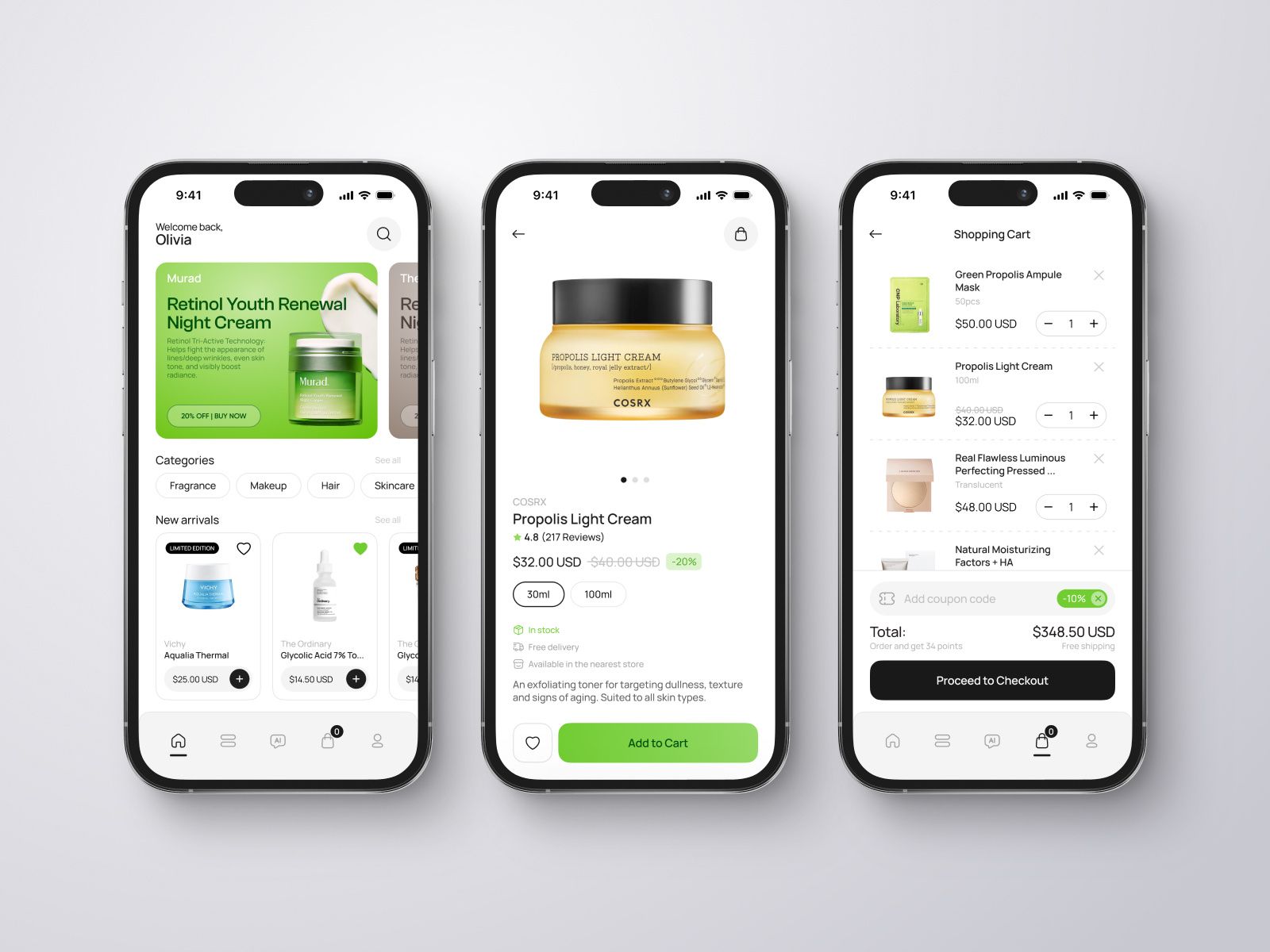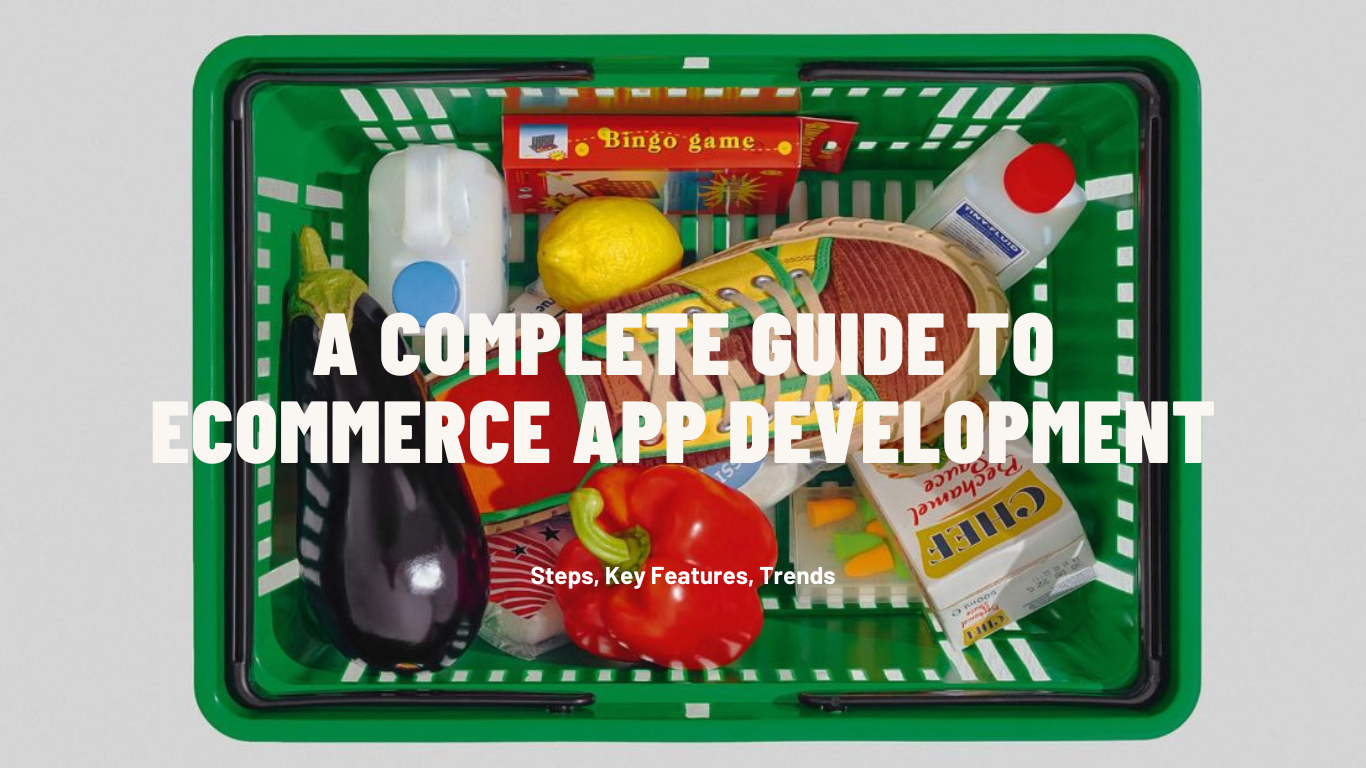It’s quite easy to notice that mobile traffic is increasing from year to year. That’s, partially, one of the reasons why in 2023, 56% of all online sales were made from mobile devices. Do you realize what it means? In short, you should not only improve your store’s website but also consider working on the eCommerce app development. No need to trick you — that’s a long journey that requires a lot of patience, time, effort, and money. To make this journey easier for you, we created this complete guide to e Commerce mobile application development.To dive deeper into mobile possibilities, consider exploring our mobile development services.

What is an eCommerce mobile app?
To learn how your business can thrive thanks to online purchases made from smartphones, let’s start from the very basics. Learn what an eCommerce mobile app is.
A mobile commerce application refers to a software solution that enables users to buy things using their smartphones. When online retailers build an eCommerce app, they aim to create a digital mobile space. This space can be used as efficiently as a regular store’s website.
The popularity of such software solutions is growing for solid reasons. First of all, many customers find it more convenient to shop for different items whenever they can access their mobile gadgets. Obviously, entrepreneurs don’t want to miss such business opportunities. They may help them boost their businesses by leveraging the power of an increasing audience.
Although for dedicated clients there are very few differences between websites and apps, it’s better for businesses to consider this type of scaling if they want to reach new audiences.
Types of eCommerce apps
Before you learn how to build eCommerce apps, you should find out which exact type will satisfy your needs best. We can classify these solutions into the following categories:
- Native apps
If you know that the biggest part of your target audience prefers iPhones to make online purchases, which is relevant for 35.8% of all sales, there’s a reason for creating an iOS native app. It will be a mobile solution providing a perfect user experience for iOS users. Consider that creating an app that will be exclusive to a particular operating system might be expensive. - Hybrid apps
Hybrid apps are for those who don't make any difference between users. Thanks to the fact that they are created with the use of web technologies, they can be used natively on any device. They are compatible with different operating systems, which also makes them cheaper. However, native apps might showcase a more efficient performance. - Progressive web apps (PWAs)
Unlike the two previous types, PWAs don’t depend on the type of devices your clients are going to use. The trick is that these applications are launched through a web browser but provide a mobile-app-like user experience. For that user experience, you might pay with some functionalities.
How To Build an eCommerce App
In order to create an eCommerce, you need to come up with a strategic approach and attention to crucial details. Here are the key steps you need to take on your way to custom eCommerce app development.
- Define Your Purpose: Clearly outline the goals and purpose of your eCommerce app. Identify your target audience, niche, and the unique value proposition you aim to offer.
- Market Research: Conduct thorough market research to understand your competitors. Learn more about target audience preferences and industry trends. Analyze successful eCommerce apps to draw inspiration and learn from their strategies.
- Choose the Right Technology Stack: Select a suitable technology stack based on your app's requirements. Consider such factors as platform (iOS, Android, or both), programming languages, and frameworks.
- Robust Backend Development: Develop a robust backend. It should be able to handle the complexities of eCommerce, including inventory management, order processing, and secure payment gateways. Consider using scalable databases and server architecture.
- Secure Payment Gateways: Implement secure and reliable payment gateways to instill trust in your users. Provide various payment options, including credit cards, digital wallets, and other popular methods.
- Efficient Product Management: Streamline product management with features like product categorization, search filters, and detailed product pages. Include high-quality images, informative descriptions, and customer reviews.
- Seamless Checkout Process: Optimize the checkout process for simplicity and speed. Implement features like guest checkouts, one-click payments, and real-time order tracking to enhance the user experience.
- Integrate Push Notifications: Keep users engaged with timely push notifications. Notify them about promotions, discounts, order confirmations, and shipment updates to encourage repeat visits.
- Testing and Quality Assurance: Rigorously test your app for functionality, security, and performance. Conduct beta testing to gather user feedback and make necessary improvements before the official launch.
- Launch and Marketing: Plan a strategic launch, accompanied by a marketing campaign to generate buzz. Utilize digital marketing channels, social media, and influencers to attract your target audience.
- Gather and Analyze Data: Implement analytics tools to track user behavior, preferences, and sales metrics. Leverage this data to continuously improve your app, enhance user experience, and stay ahead of market trends.
Shopify vs BigCommerce vs Magento
You can hire an experienced team of specialists for your e Commerce app design that will follow all the steps above. However, you also have to choose a reliable and effective eCommerce platform to launch your applications. Here are some of the most popular options:
- Shopify: It has been one of the biggest eCommerce platforms since 2004. More than a million online businesses take advantage of its advanced functionality and plugins. A big part of them is selling their products through mobile applications. The biggest advantage of Shopify for your business is that it provides very extensive inventory listings. One more thing is that Shopify offers a large number of functional built-in plugins for analytics. With its professional support, you’ll be able to keep your eCommerce application always updated and relevant.
- BigCommerce: BigCommerce has been efficiently uniting online businesses since 2009. Entrepreneurs all over the world praise this marketplace for multi-currency sales that help businesses globalize their influence and reach international markets. Additionally, BigCommerce is well-known for its advanced SEO capabilities that help to drive more organic traffic and convert it into sales.
- Magento: This eCommerce platform is known among online retailers as the most customizable marketplace. If you want to create a tailored e-commerce application, Magento with its 5,000 should perfectly suit your needs. In addition to this, Magento enables businesses to extend their presence to an international audience. Also, it’s highly praised for great functionality and aesthetic features for online stores.
eCommerce app development: Best Practices

Embarking on eCommerce app development demands a strategic approach to ensure a robust, user-friendly, and successful product. Consider these practices to take the maximum advantage of the solution:
- User-Centric Design: Prioritize a user-centric design that emphasizes simplicity and intuitive navigation. Understand your target audience's preferences and create an interface that enhances the overall shopping experience.
- Performance Optimization: Focus on optimizing app performance by minimizing load times and ensuring smooth transitions. Compress images, utilize caching mechanisms, and streamline code to enhance overall speed.
- Personalization Features: Implement personalized features based on user behavior, preferences, and purchase history. Tailored recommendations, personalized offers, and a user-specific interface contribute to higher engagement and conversions.
- Scalable Architecture: Build a scalable architecture that can accommodate growing user numbers and increasing data volumes. Scalability is crucial for handling peak loads and ensuring consistent app performance.
- Cross-Platform Compatibility: Opt for cross-platform compatibility to reach a broader audience. Develop your app for both iOS and Android platforms, ensuring consistent functionality and design across different devices.
- Regular Updates and Maintenance: Stay proactive with regular app updates and maintenance to fix bugs, introduce new features, and address security vulnerabilities. Keeping your app up-to-date ensures a positive user experience and demonstrates commitment to your users.
- Feedback Loops: Establish feedback loops with users through in-app surveys, reviews, and customer support channels. Act on feedback promptly to address concerns, improve features, and enhance overall satisfaction.
- Social Media Integration: Leverage social media integration to amplify your app's reach and user engagement. Enable users to share their purchases, wishlist items, and reviews on social platforms, fostering brand awareness and user-generated content.
Ready to take your online business to the next level with a custom eCommerce app? Let's make it happen! Explore our mobile development services and discover how we've transformed businesses through our innovative solutions by checking out our case studies. Contact us today to start your journey towards mobile excellence.
FAQ
What is eCommerce app development?
eCommerce app development is the process of creating mobile-based software solutions to list and display different items available at your online store for sale.
What are the benefits of creating an eCommerce app?
One of the benefits is that your buyers and clients can access your products from their smartphones. Also, they can make purchases from anywhere and maybe track their orders.
Why create an eCommerce app?
An efficient eCommerce application should be user-friendly and scalable. It should display products and pricing and offer some contact forms as well as secure payment gateways.
How much does it cost to develop an eCommerce app?
It depends on the design and functionality your business needs. The lowest price is estimated at around $10,000.
Does it take long to create an eCommerce app?
Depending on the complexity of the process, the development process might take from several weeks to a couple of months.



